Leadership and Psychological Capital
VerifiedAdded on 2023/05/29
|12
|3032
|368
AI Summary
This paper explores the correlation between leadership, employee performance and psychological capital. It discusses the importance of leadership theories, psychological capital and emotions in enhancing employee performance.
Contribute Materials
Your contribution can guide someone’s learning journey. Share your
documents today.
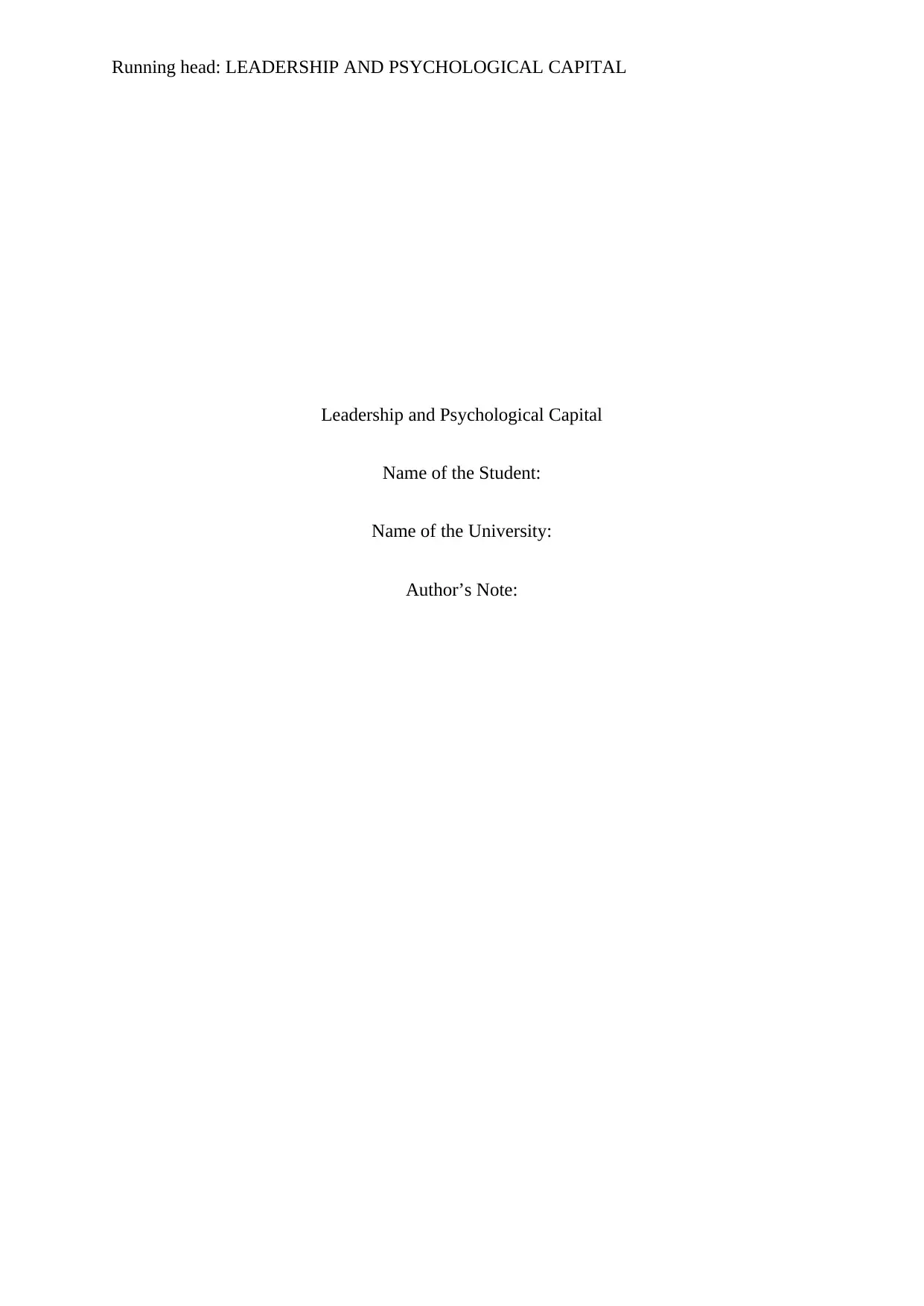
Running head: LEADERSHIP AND PSYCHOLOGICAL CAPITAL
Leadership and Psychological Capital
Name of the Student:
Name of the University:
Author’s Note:
Leadership and Psychological Capital
Name of the Student:
Name of the University:
Author’s Note:
Secure Best Marks with AI Grader
Need help grading? Try our AI Grader for instant feedback on your assignments.
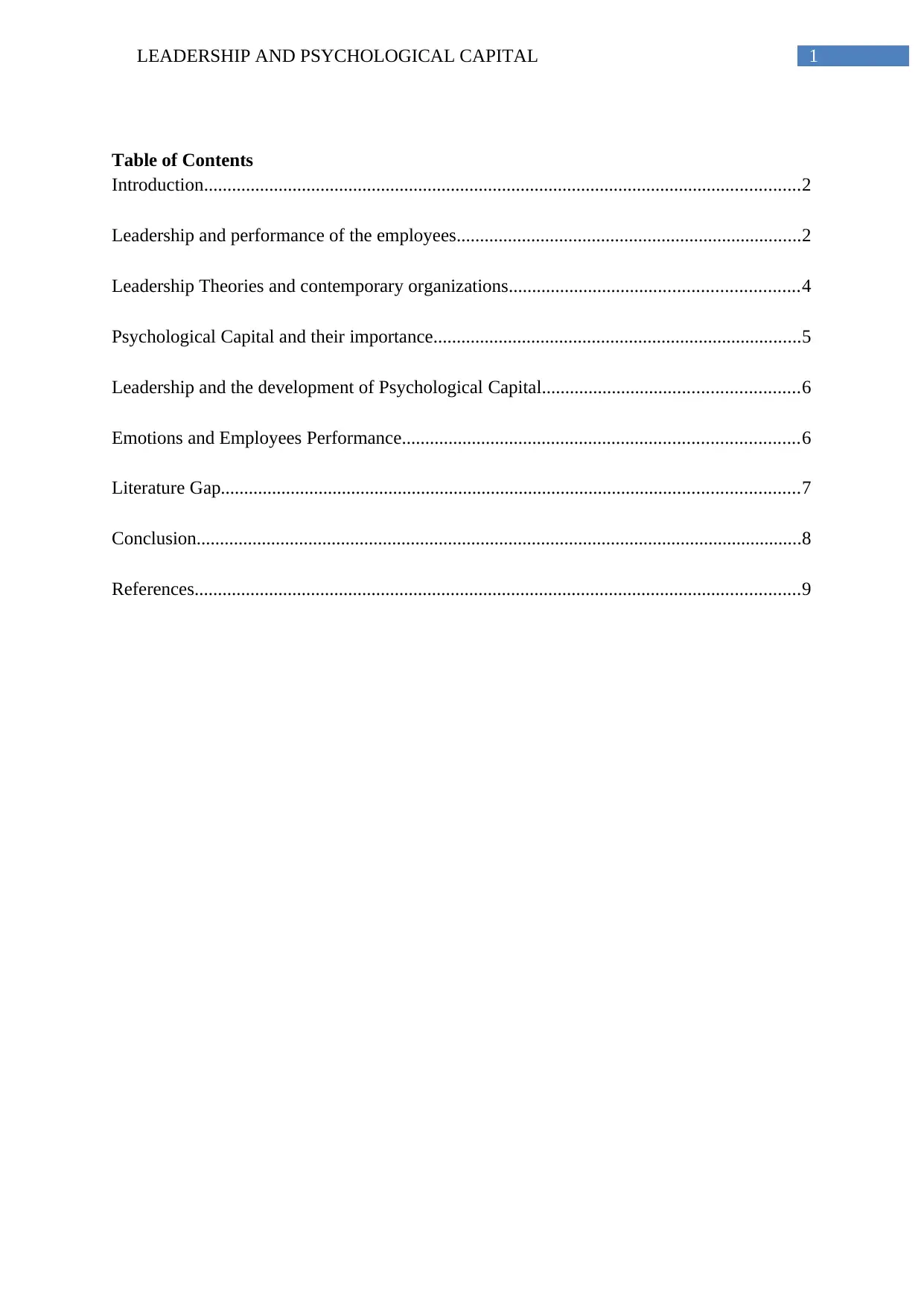
1LEADERSHIP AND PSYCHOLOGICAL CAPITAL
Table of Contents
Introduction................................................................................................................................2
Leadership and performance of the employees..........................................................................2
Leadership Theories and contemporary organizations..............................................................4
Psychological Capital and their importance...............................................................................5
Leadership and the development of Psychological Capital.......................................................6
Emotions and Employees Performance.....................................................................................6
Literature Gap............................................................................................................................7
Conclusion..................................................................................................................................8
References..................................................................................................................................9
Table of Contents
Introduction................................................................................................................................2
Leadership and performance of the employees..........................................................................2
Leadership Theories and contemporary organizations..............................................................4
Psychological Capital and their importance...............................................................................5
Leadership and the development of Psychological Capital.......................................................6
Emotions and Employees Performance.....................................................................................6
Literature Gap............................................................................................................................7
Conclusion..................................................................................................................................8
References..................................................................................................................................9
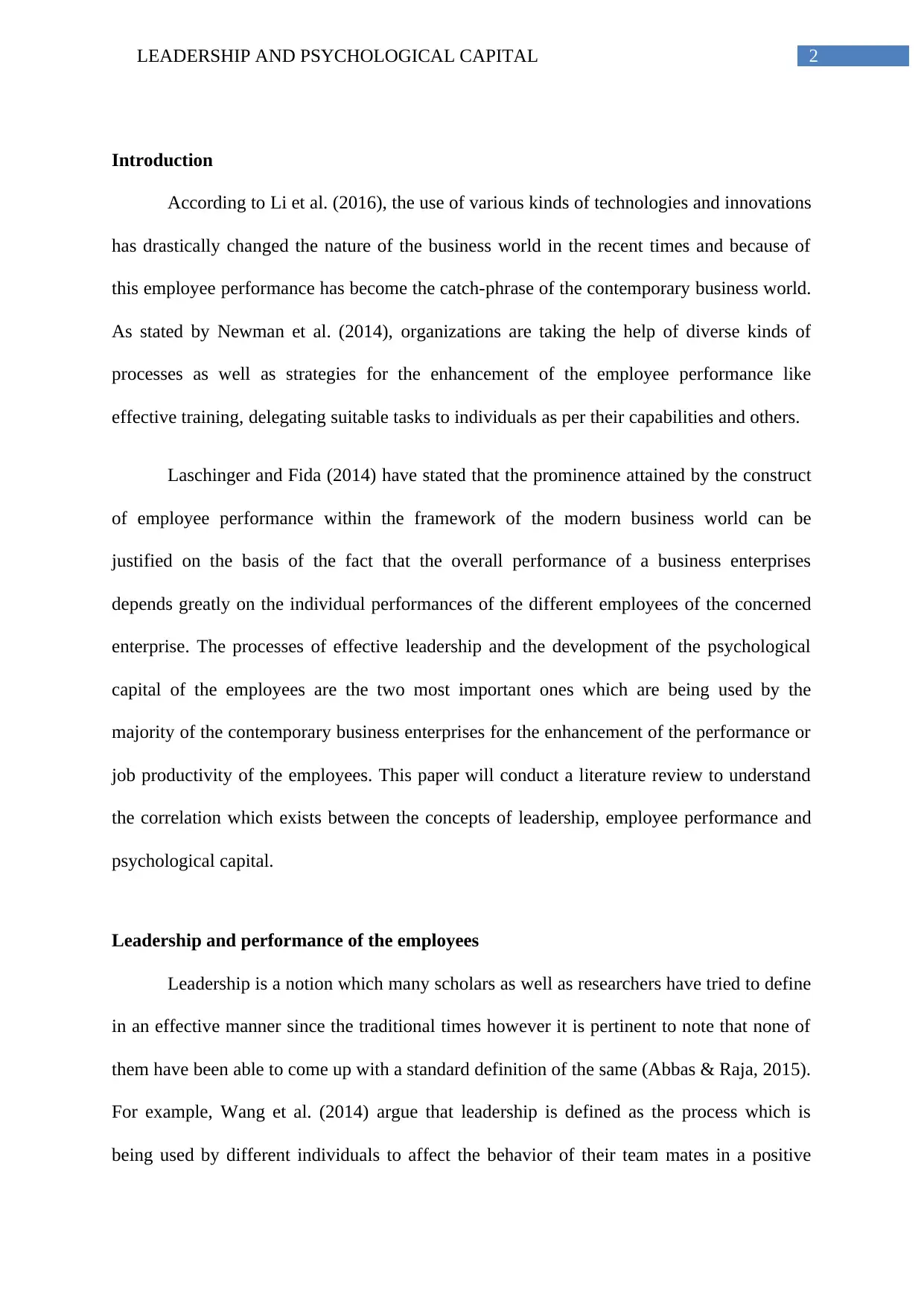
2LEADERSHIP AND PSYCHOLOGICAL CAPITAL
Introduction
According to Li et al. (2016), the use of various kinds of technologies and innovations
has drastically changed the nature of the business world in the recent times and because of
this employee performance has become the catch-phrase of the contemporary business world.
As stated by Newman et al. (2014), organizations are taking the help of diverse kinds of
processes as well as strategies for the enhancement of the employee performance like
effective training, delegating suitable tasks to individuals as per their capabilities and others.
Laschinger and Fida (2014) have stated that the prominence attained by the construct
of employee performance within the framework of the modern business world can be
justified on the basis of the fact that the overall performance of a business enterprises
depends greatly on the individual performances of the different employees of the concerned
enterprise. The processes of effective leadership and the development of the psychological
capital of the employees are the two most important ones which are being used by the
majority of the contemporary business enterprises for the enhancement of the performance or
job productivity of the employees. This paper will conduct a literature review to understand
the correlation which exists between the concepts of leadership, employee performance and
psychological capital.
Leadership and performance of the employees
Leadership is a notion which many scholars as well as researchers have tried to define
in an effective manner since the traditional times however it is pertinent to note that none of
them have been able to come up with a standard definition of the same (Abbas & Raja, 2015).
For example, Wang et al. (2014) argue that leadership is defined as the process which is
being used by different individuals to affect the behavior of their team mates in a positive
Introduction
According to Li et al. (2016), the use of various kinds of technologies and innovations
has drastically changed the nature of the business world in the recent times and because of
this employee performance has become the catch-phrase of the contemporary business world.
As stated by Newman et al. (2014), organizations are taking the help of diverse kinds of
processes as well as strategies for the enhancement of the employee performance like
effective training, delegating suitable tasks to individuals as per their capabilities and others.
Laschinger and Fida (2014) have stated that the prominence attained by the construct
of employee performance within the framework of the modern business world can be
justified on the basis of the fact that the overall performance of a business enterprises
depends greatly on the individual performances of the different employees of the concerned
enterprise. The processes of effective leadership and the development of the psychological
capital of the employees are the two most important ones which are being used by the
majority of the contemporary business enterprises for the enhancement of the performance or
job productivity of the employees. This paper will conduct a literature review to understand
the correlation which exists between the concepts of leadership, employee performance and
psychological capital.
Leadership and performance of the employees
Leadership is a notion which many scholars as well as researchers have tried to define
in an effective manner since the traditional times however it is pertinent to note that none of
them have been able to come up with a standard definition of the same (Abbas & Raja, 2015).
For example, Wang et al. (2014) argue that leadership is defined as the process which is
being used by different individuals to affect the behavior of their team mates in a positive
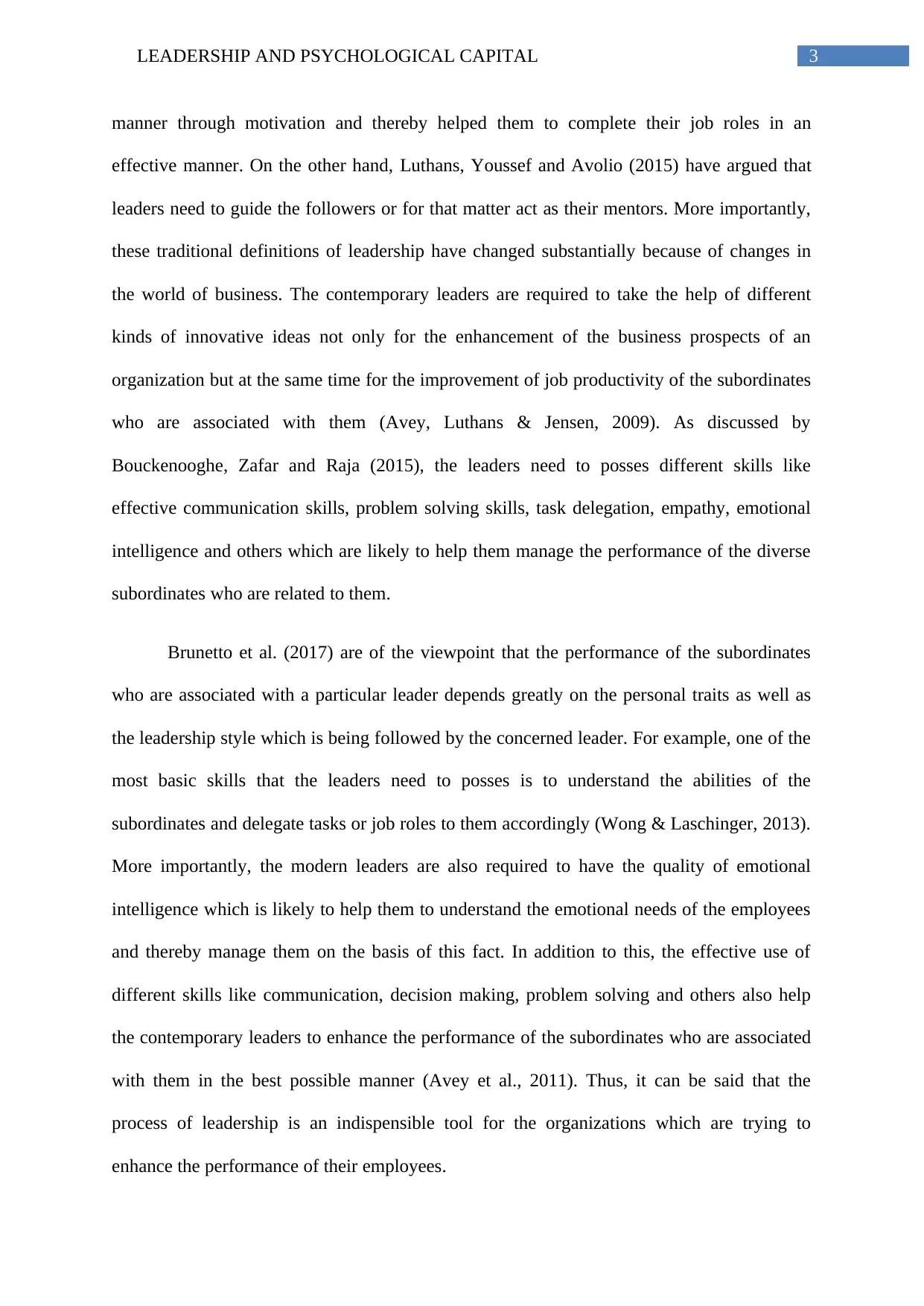
3LEADERSHIP AND PSYCHOLOGICAL CAPITAL
manner through motivation and thereby helped them to complete their job roles in an
effective manner. On the other hand, Luthans, Youssef and Avolio (2015) have argued that
leaders need to guide the followers or for that matter act as their mentors. More importantly,
these traditional definitions of leadership have changed substantially because of changes in
the world of business. The contemporary leaders are required to take the help of different
kinds of innovative ideas not only for the enhancement of the business prospects of an
organization but at the same time for the improvement of job productivity of the subordinates
who are associated with them (Avey, Luthans & Jensen, 2009). As discussed by
Bouckenooghe, Zafar and Raja (2015), the leaders need to posses different skills like
effective communication skills, problem solving skills, task delegation, empathy, emotional
intelligence and others which are likely to help them manage the performance of the diverse
subordinates who are related to them.
Brunetto et al. (2017) are of the viewpoint that the performance of the subordinates
who are associated with a particular leader depends greatly on the personal traits as well as
the leadership style which is being followed by the concerned leader. For example, one of the
most basic skills that the leaders need to posses is to understand the abilities of the
subordinates and delegate tasks or job roles to them accordingly (Wong & Laschinger, 2013).
More importantly, the modern leaders are also required to have the quality of emotional
intelligence which is likely to help them to understand the emotional needs of the employees
and thereby manage them on the basis of this fact. In addition to this, the effective use of
different skills like communication, decision making, problem solving and others also help
the contemporary leaders to enhance the performance of the subordinates who are associated
with them in the best possible manner (Avey et al., 2011). Thus, it can be said that the
process of leadership is an indispensible tool for the organizations which are trying to
enhance the performance of their employees.
manner through motivation and thereby helped them to complete their job roles in an
effective manner. On the other hand, Luthans, Youssef and Avolio (2015) have argued that
leaders need to guide the followers or for that matter act as their mentors. More importantly,
these traditional definitions of leadership have changed substantially because of changes in
the world of business. The contemporary leaders are required to take the help of different
kinds of innovative ideas not only for the enhancement of the business prospects of an
organization but at the same time for the improvement of job productivity of the subordinates
who are associated with them (Avey, Luthans & Jensen, 2009). As discussed by
Bouckenooghe, Zafar and Raja (2015), the leaders need to posses different skills like
effective communication skills, problem solving skills, task delegation, empathy, emotional
intelligence and others which are likely to help them manage the performance of the diverse
subordinates who are related to them.
Brunetto et al. (2017) are of the viewpoint that the performance of the subordinates
who are associated with a particular leader depends greatly on the personal traits as well as
the leadership style which is being followed by the concerned leader. For example, one of the
most basic skills that the leaders need to posses is to understand the abilities of the
subordinates and delegate tasks or job roles to them accordingly (Wong & Laschinger, 2013).
More importantly, the modern leaders are also required to have the quality of emotional
intelligence which is likely to help them to understand the emotional needs of the employees
and thereby manage them on the basis of this fact. In addition to this, the effective use of
different skills like communication, decision making, problem solving and others also help
the contemporary leaders to enhance the performance of the subordinates who are associated
with them in the best possible manner (Avey et al., 2011). Thus, it can be said that the
process of leadership is an indispensible tool for the organizations which are trying to
enhance the performance of their employees.
Secure Best Marks with AI Grader
Need help grading? Try our AI Grader for instant feedback on your assignments.
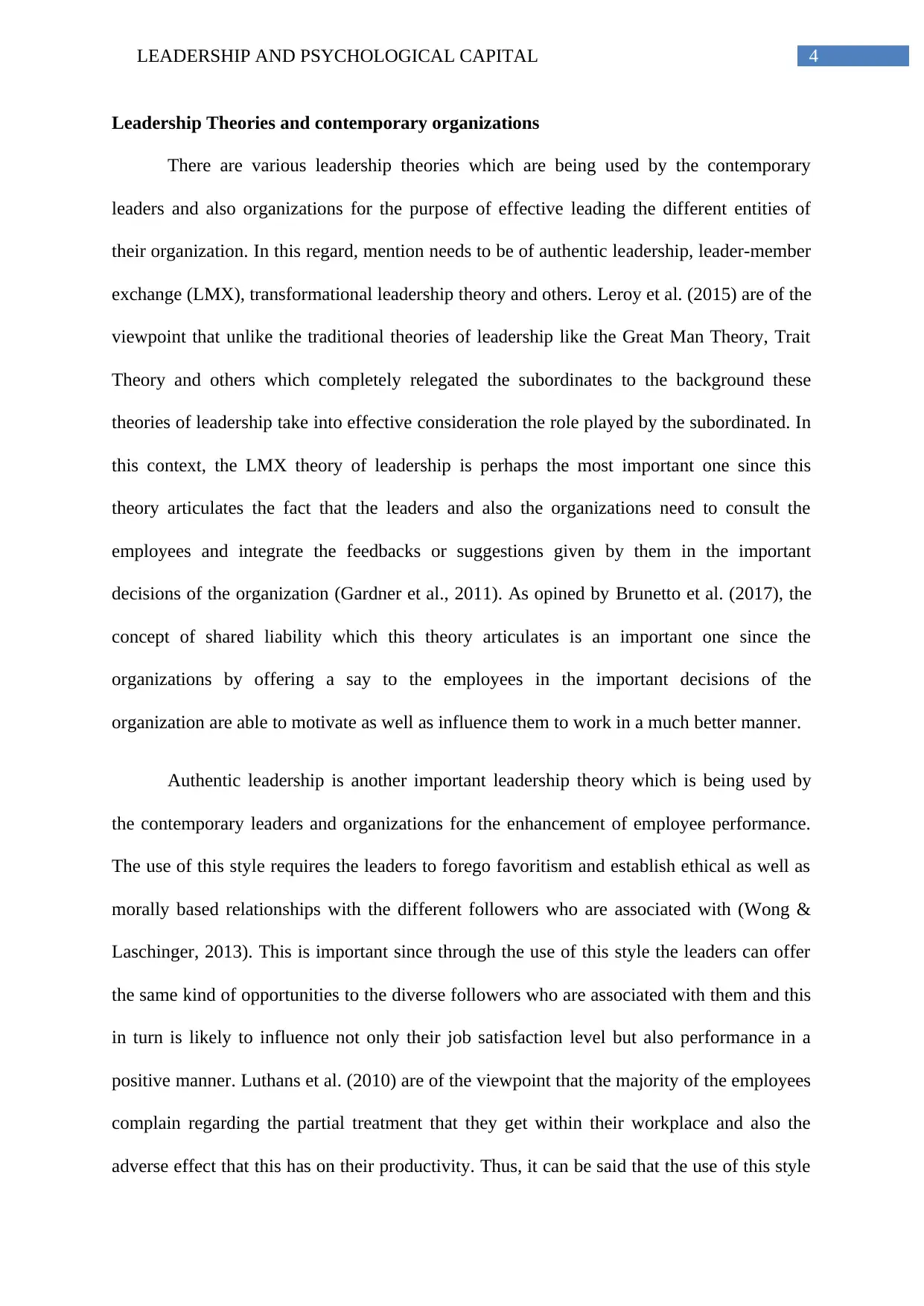
4LEADERSHIP AND PSYCHOLOGICAL CAPITAL
Leadership Theories and contemporary organizations
There are various leadership theories which are being used by the contemporary
leaders and also organizations for the purpose of effective leading the different entities of
their organization. In this regard, mention needs to be of authentic leadership, leader-member
exchange (LMX), transformational leadership theory and others. Leroy et al. (2015) are of the
viewpoint that unlike the traditional theories of leadership like the Great Man Theory, Trait
Theory and others which completely relegated the subordinates to the background these
theories of leadership take into effective consideration the role played by the subordinated. In
this context, the LMX theory of leadership is perhaps the most important one since this
theory articulates the fact that the leaders and also the organizations need to consult the
employees and integrate the feedbacks or suggestions given by them in the important
decisions of the organization (Gardner et al., 2011). As opined by Brunetto et al. (2017), the
concept of shared liability which this theory articulates is an important one since the
organizations by offering a say to the employees in the important decisions of the
organization are able to motivate as well as influence them to work in a much better manner.
Authentic leadership is another important leadership theory which is being used by
the contemporary leaders and organizations for the enhancement of employee performance.
The use of this style requires the leaders to forego favoritism and establish ethical as well as
morally based relationships with the different followers who are associated with (Wong &
Laschinger, 2013). This is important since through the use of this style the leaders can offer
the same kind of opportunities to the diverse followers who are associated with them and this
in turn is likely to influence not only their job satisfaction level but also performance in a
positive manner. Luthans et al. (2010) are of the viewpoint that the majority of the employees
complain regarding the partial treatment that they get within their workplace and also the
adverse effect that this has on their productivity. Thus, it can be said that the use of this style
Leadership Theories and contemporary organizations
There are various leadership theories which are being used by the contemporary
leaders and also organizations for the purpose of effective leading the different entities of
their organization. In this regard, mention needs to be of authentic leadership, leader-member
exchange (LMX), transformational leadership theory and others. Leroy et al. (2015) are of the
viewpoint that unlike the traditional theories of leadership like the Great Man Theory, Trait
Theory and others which completely relegated the subordinates to the background these
theories of leadership take into effective consideration the role played by the subordinated. In
this context, the LMX theory of leadership is perhaps the most important one since this
theory articulates the fact that the leaders and also the organizations need to consult the
employees and integrate the feedbacks or suggestions given by them in the important
decisions of the organization (Gardner et al., 2011). As opined by Brunetto et al. (2017), the
concept of shared liability which this theory articulates is an important one since the
organizations by offering a say to the employees in the important decisions of the
organization are able to motivate as well as influence them to work in a much better manner.
Authentic leadership is another important leadership theory which is being used by
the contemporary leaders and organizations for the enhancement of employee performance.
The use of this style requires the leaders to forego favoritism and establish ethical as well as
morally based relationships with the different followers who are associated with (Wong &
Laschinger, 2013). This is important since through the use of this style the leaders can offer
the same kind of opportunities to the diverse followers who are associated with them and this
in turn is likely to influence not only their job satisfaction level but also performance in a
positive manner. Luthans et al. (2010) are of the viewpoint that the majority of the employees
complain regarding the partial treatment that they get within their workplace and also the
adverse effect that this has on their productivity. Thus, it can be said that the use of this style
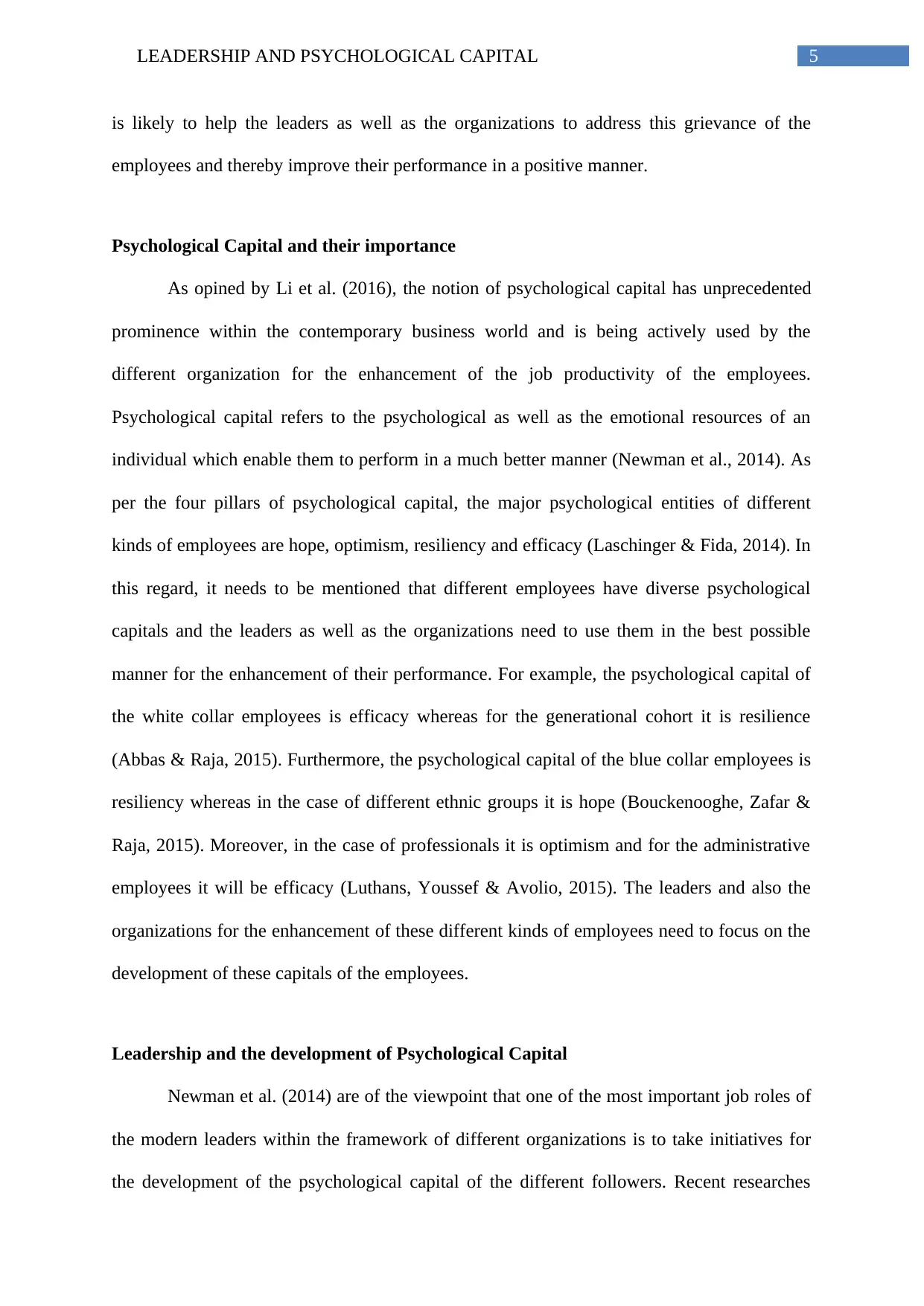
5LEADERSHIP AND PSYCHOLOGICAL CAPITAL
is likely to help the leaders as well as the organizations to address this grievance of the
employees and thereby improve their performance in a positive manner.
Psychological Capital and their importance
As opined by Li et al. (2016), the notion of psychological capital has unprecedented
prominence within the contemporary business world and is being actively used by the
different organization for the enhancement of the job productivity of the employees.
Psychological capital refers to the psychological as well as the emotional resources of an
individual which enable them to perform in a much better manner (Newman et al., 2014). As
per the four pillars of psychological capital, the major psychological entities of different
kinds of employees are hope, optimism, resiliency and efficacy (Laschinger & Fida, 2014). In
this regard, it needs to be mentioned that different employees have diverse psychological
capitals and the leaders as well as the organizations need to use them in the best possible
manner for the enhancement of their performance. For example, the psychological capital of
the white collar employees is efficacy whereas for the generational cohort it is resilience
(Abbas & Raja, 2015). Furthermore, the psychological capital of the blue collar employees is
resiliency whereas in the case of different ethnic groups it is hope (Bouckenooghe, Zafar &
Raja, 2015). Moreover, in the case of professionals it is optimism and for the administrative
employees it will be efficacy (Luthans, Youssef & Avolio, 2015). The leaders and also the
organizations for the enhancement of these different kinds of employees need to focus on the
development of these capitals of the employees.
Leadership and the development of Psychological Capital
Newman et al. (2014) are of the viewpoint that one of the most important job roles of
the modern leaders within the framework of different organizations is to take initiatives for
the development of the psychological capital of the different followers. Recent researches
is likely to help the leaders as well as the organizations to address this grievance of the
employees and thereby improve their performance in a positive manner.
Psychological Capital and their importance
As opined by Li et al. (2016), the notion of psychological capital has unprecedented
prominence within the contemporary business world and is being actively used by the
different organization for the enhancement of the job productivity of the employees.
Psychological capital refers to the psychological as well as the emotional resources of an
individual which enable them to perform in a much better manner (Newman et al., 2014). As
per the four pillars of psychological capital, the major psychological entities of different
kinds of employees are hope, optimism, resiliency and efficacy (Laschinger & Fida, 2014). In
this regard, it needs to be mentioned that different employees have diverse psychological
capitals and the leaders as well as the organizations need to use them in the best possible
manner for the enhancement of their performance. For example, the psychological capital of
the white collar employees is efficacy whereas for the generational cohort it is resilience
(Abbas & Raja, 2015). Furthermore, the psychological capital of the blue collar employees is
resiliency whereas in the case of different ethnic groups it is hope (Bouckenooghe, Zafar &
Raja, 2015). Moreover, in the case of professionals it is optimism and for the administrative
employees it will be efficacy (Luthans, Youssef & Avolio, 2015). The leaders and also the
organizations for the enhancement of these different kinds of employees need to focus on the
development of these capitals of the employees.
Leadership and the development of Psychological Capital
Newman et al. (2014) are of the viewpoint that one of the most important job roles of
the modern leaders within the framework of different organizations is to take initiatives for
the development of the psychological capital of the different followers. Recent researches
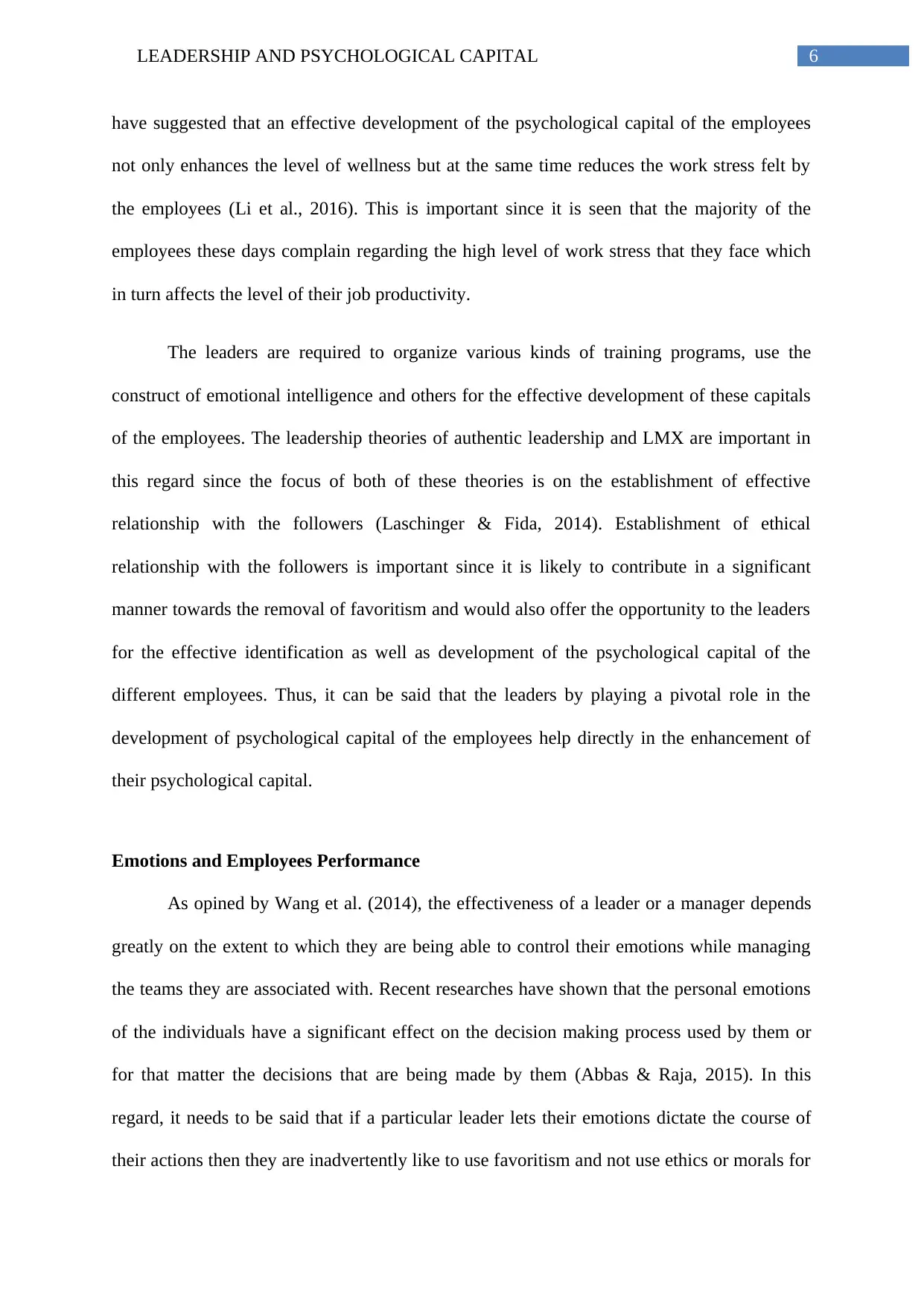
6LEADERSHIP AND PSYCHOLOGICAL CAPITAL
have suggested that an effective development of the psychological capital of the employees
not only enhances the level of wellness but at the same time reduces the work stress felt by
the employees (Li et al., 2016). This is important since it is seen that the majority of the
employees these days complain regarding the high level of work stress that they face which
in turn affects the level of their job productivity.
The leaders are required to organize various kinds of training programs, use the
construct of emotional intelligence and others for the effective development of these capitals
of the employees. The leadership theories of authentic leadership and LMX are important in
this regard since the focus of both of these theories is on the establishment of effective
relationship with the followers (Laschinger & Fida, 2014). Establishment of ethical
relationship with the followers is important since it is likely to contribute in a significant
manner towards the removal of favoritism and would also offer the opportunity to the leaders
for the effective identification as well as development of the psychological capital of the
different employees. Thus, it can be said that the leaders by playing a pivotal role in the
development of psychological capital of the employees help directly in the enhancement of
their psychological capital.
Emotions and Employees Performance
As opined by Wang et al. (2014), the effectiveness of a leader or a manager depends
greatly on the extent to which they are being able to control their emotions while managing
the teams they are associated with. Recent researches have shown that the personal emotions
of the individuals have a significant effect on the decision making process used by them or
for that matter the decisions that are being made by them (Abbas & Raja, 2015). In this
regard, it needs to be said that if a particular leader lets their emotions dictate the course of
their actions then they are inadvertently like to use favoritism and not use ethics or morals for
have suggested that an effective development of the psychological capital of the employees
not only enhances the level of wellness but at the same time reduces the work stress felt by
the employees (Li et al., 2016). This is important since it is seen that the majority of the
employees these days complain regarding the high level of work stress that they face which
in turn affects the level of their job productivity.
The leaders are required to organize various kinds of training programs, use the
construct of emotional intelligence and others for the effective development of these capitals
of the employees. The leadership theories of authentic leadership and LMX are important in
this regard since the focus of both of these theories is on the establishment of effective
relationship with the followers (Laschinger & Fida, 2014). Establishment of ethical
relationship with the followers is important since it is likely to contribute in a significant
manner towards the removal of favoritism and would also offer the opportunity to the leaders
for the effective identification as well as development of the psychological capital of the
different employees. Thus, it can be said that the leaders by playing a pivotal role in the
development of psychological capital of the employees help directly in the enhancement of
their psychological capital.
Emotions and Employees Performance
As opined by Wang et al. (2014), the effectiveness of a leader or a manager depends
greatly on the extent to which they are being able to control their emotions while managing
the teams they are associated with. Recent researches have shown that the personal emotions
of the individuals have a significant effect on the decision making process used by them or
for that matter the decisions that are being made by them (Abbas & Raja, 2015). In this
regard, it needs to be said that if a particular leader lets their emotions dictate the course of
their actions then they are inadvertently like to use favoritism and not use ethics or morals for
Paraphrase This Document
Need a fresh take? Get an instant paraphrase of this document with our AI Paraphraser
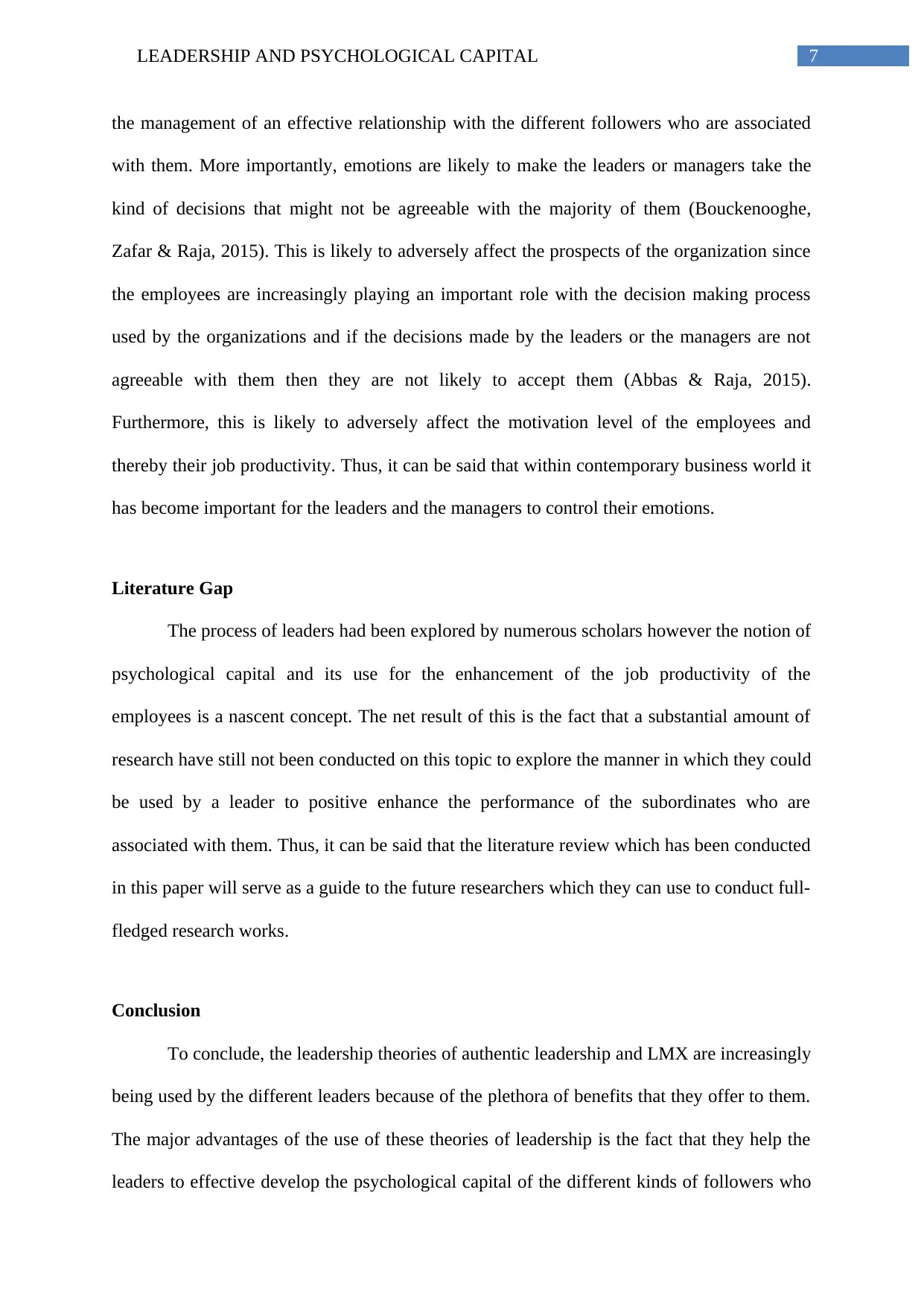
7LEADERSHIP AND PSYCHOLOGICAL CAPITAL
the management of an effective relationship with the different followers who are associated
with them. More importantly, emotions are likely to make the leaders or managers take the
kind of decisions that might not be agreeable with the majority of them (Bouckenooghe,
Zafar & Raja, 2015). This is likely to adversely affect the prospects of the organization since
the employees are increasingly playing an important role with the decision making process
used by the organizations and if the decisions made by the leaders or the managers are not
agreeable with them then they are not likely to accept them (Abbas & Raja, 2015).
Furthermore, this is likely to adversely affect the motivation level of the employees and
thereby their job productivity. Thus, it can be said that within contemporary business world it
has become important for the leaders and the managers to control their emotions.
Literature Gap
The process of leaders had been explored by numerous scholars however the notion of
psychological capital and its use for the enhancement of the job productivity of the
employees is a nascent concept. The net result of this is the fact that a substantial amount of
research have still not been conducted on this topic to explore the manner in which they could
be used by a leader to positive enhance the performance of the subordinates who are
associated with them. Thus, it can be said that the literature review which has been conducted
in this paper will serve as a guide to the future researchers which they can use to conduct full-
fledged research works.
Conclusion
To conclude, the leadership theories of authentic leadership and LMX are increasingly
being used by the different leaders because of the plethora of benefits that they offer to them.
The major advantages of the use of these theories of leadership is the fact that they help the
leaders to effective develop the psychological capital of the different kinds of followers who
the management of an effective relationship with the different followers who are associated
with them. More importantly, emotions are likely to make the leaders or managers take the
kind of decisions that might not be agreeable with the majority of them (Bouckenooghe,
Zafar & Raja, 2015). This is likely to adversely affect the prospects of the organization since
the employees are increasingly playing an important role with the decision making process
used by the organizations and if the decisions made by the leaders or the managers are not
agreeable with them then they are not likely to accept them (Abbas & Raja, 2015).
Furthermore, this is likely to adversely affect the motivation level of the employees and
thereby their job productivity. Thus, it can be said that within contemporary business world it
has become important for the leaders and the managers to control their emotions.
Literature Gap
The process of leaders had been explored by numerous scholars however the notion of
psychological capital and its use for the enhancement of the job productivity of the
employees is a nascent concept. The net result of this is the fact that a substantial amount of
research have still not been conducted on this topic to explore the manner in which they could
be used by a leader to positive enhance the performance of the subordinates who are
associated with them. Thus, it can be said that the literature review which has been conducted
in this paper will serve as a guide to the future researchers which they can use to conduct full-
fledged research works.
Conclusion
To conclude, the leadership theories of authentic leadership and LMX are increasingly
being used by the different leaders because of the plethora of benefits that they offer to them.
The major advantages of the use of these theories of leadership is the fact that they help the
leaders to effective develop the psychological capital of the different kinds of followers who
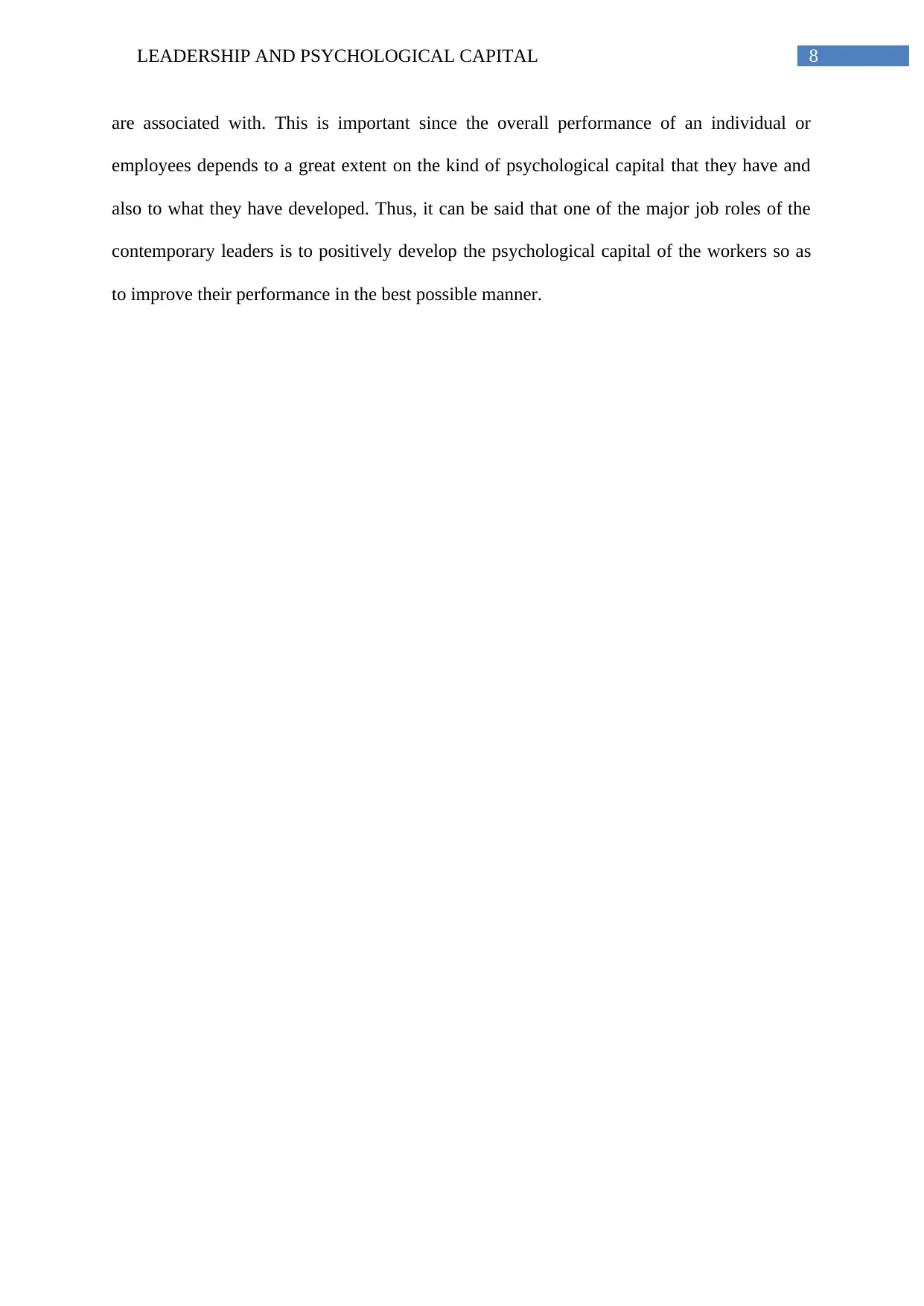
8LEADERSHIP AND PSYCHOLOGICAL CAPITAL
are associated with. This is important since the overall performance of an individual or
employees depends to a great extent on the kind of psychological capital that they have and
also to what they have developed. Thus, it can be said that one of the major job roles of the
contemporary leaders is to positively develop the psychological capital of the workers so as
to improve their performance in the best possible manner.
are associated with. This is important since the overall performance of an individual or
employees depends to a great extent on the kind of psychological capital that they have and
also to what they have developed. Thus, it can be said that one of the major job roles of the
contemporary leaders is to positively develop the psychological capital of the workers so as
to improve their performance in the best possible manner.
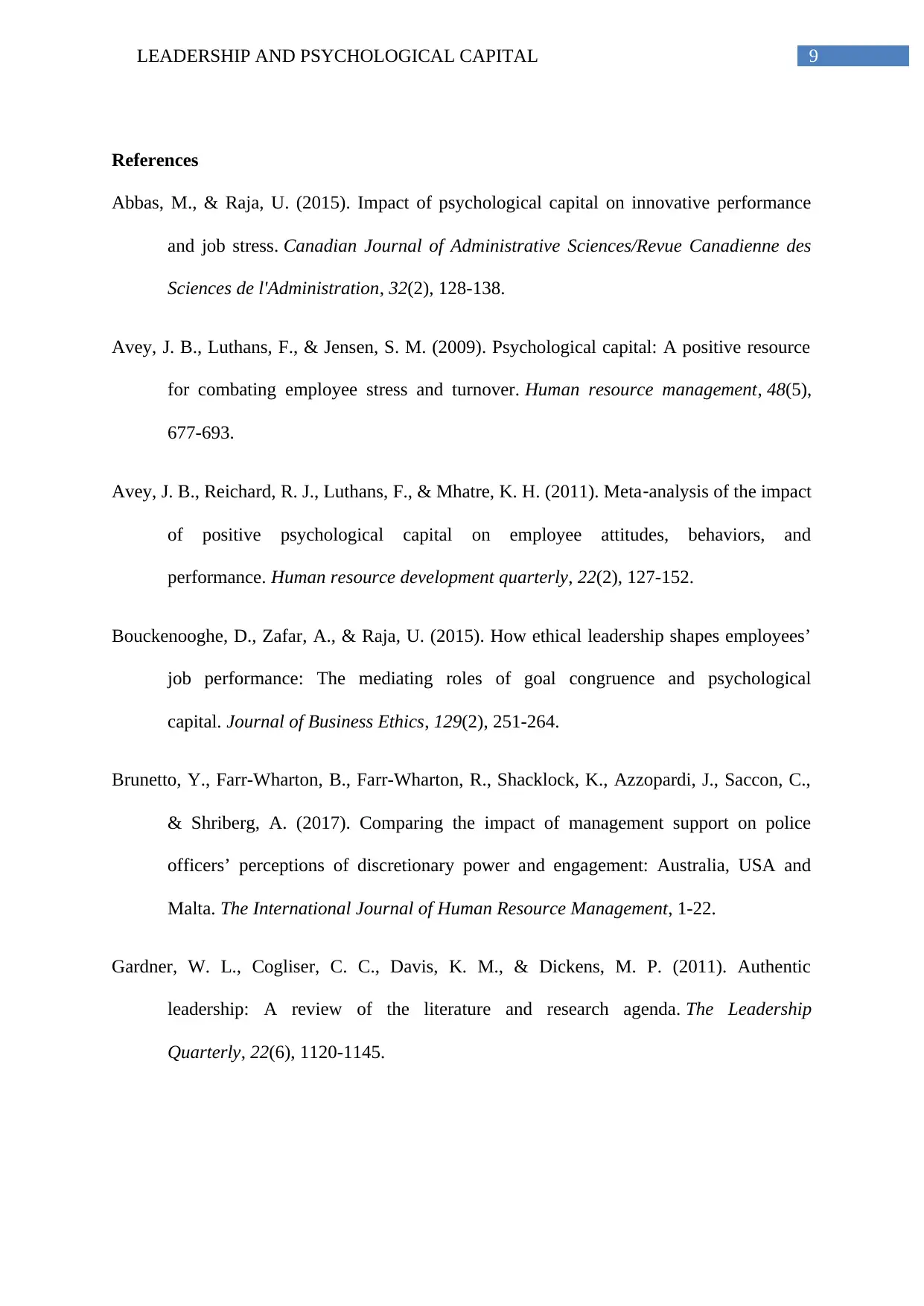
9LEADERSHIP AND PSYCHOLOGICAL CAPITAL
References
Abbas, M., & Raja, U. (2015). Impact of psychological capital on innovative performance
and job stress. Canadian Journal of Administrative Sciences/Revue Canadienne des
Sciences de l'Administration, 32(2), 128-138.
Avey, J. B., Luthans, F., & Jensen, S. M. (2009). Psychological capital: A positive resource
for combating employee stress and turnover. Human resource management, 48(5),
677-693.
Avey, J. B., Reichard, R. J., Luthans, F., & Mhatre, K. H. (2011). Meta‐analysis of the impact
of positive psychological capital on employee attitudes, behaviors, and
performance. Human resource development quarterly, 22(2), 127-152.
Bouckenooghe, D., Zafar, A., & Raja, U. (2015). How ethical leadership shapes employees’
job performance: The mediating roles of goal congruence and psychological
capital. Journal of Business Ethics, 129(2), 251-264.
Brunetto, Y., Farr-Wharton, B., Farr-Wharton, R., Shacklock, K., Azzopardi, J., Saccon, C.,
& Shriberg, A. (2017). Comparing the impact of management support on police
officers’ perceptions of discretionary power and engagement: Australia, USA and
Malta. The International Journal of Human Resource Management, 1-22.
Gardner, W. L., Cogliser, C. C., Davis, K. M., & Dickens, M. P. (2011). Authentic
leadership: A review of the literature and research agenda. The Leadership
Quarterly, 22(6), 1120-1145.
References
Abbas, M., & Raja, U. (2015). Impact of psychological capital on innovative performance
and job stress. Canadian Journal of Administrative Sciences/Revue Canadienne des
Sciences de l'Administration, 32(2), 128-138.
Avey, J. B., Luthans, F., & Jensen, S. M. (2009). Psychological capital: A positive resource
for combating employee stress and turnover. Human resource management, 48(5),
677-693.
Avey, J. B., Reichard, R. J., Luthans, F., & Mhatre, K. H. (2011). Meta‐analysis of the impact
of positive psychological capital on employee attitudes, behaviors, and
performance. Human resource development quarterly, 22(2), 127-152.
Bouckenooghe, D., Zafar, A., & Raja, U. (2015). How ethical leadership shapes employees’
job performance: The mediating roles of goal congruence and psychological
capital. Journal of Business Ethics, 129(2), 251-264.
Brunetto, Y., Farr-Wharton, B., Farr-Wharton, R., Shacklock, K., Azzopardi, J., Saccon, C.,
& Shriberg, A. (2017). Comparing the impact of management support on police
officers’ perceptions of discretionary power and engagement: Australia, USA and
Malta. The International Journal of Human Resource Management, 1-22.
Gardner, W. L., Cogliser, C. C., Davis, K. M., & Dickens, M. P. (2011). Authentic
leadership: A review of the literature and research agenda. The Leadership
Quarterly, 22(6), 1120-1145.
Secure Best Marks with AI Grader
Need help grading? Try our AI Grader for instant feedback on your assignments.
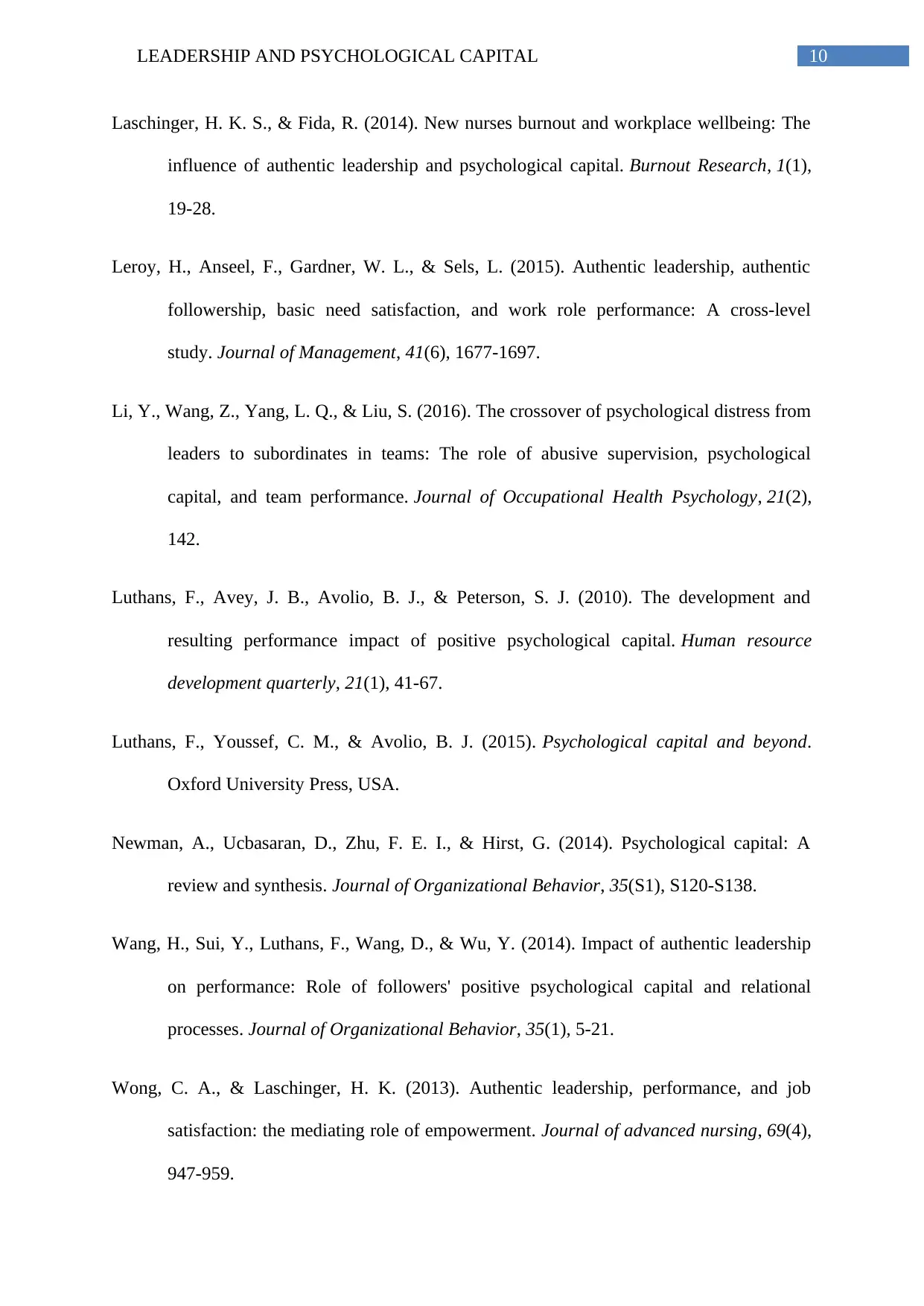
10LEADERSHIP AND PSYCHOLOGICAL CAPITAL
Laschinger, H. K. S., & Fida, R. (2014). New nurses burnout and workplace wellbeing: The
influence of authentic leadership and psychological capital. Burnout Research, 1(1),
19-28.
Leroy, H., Anseel, F., Gardner, W. L., & Sels, L. (2015). Authentic leadership, authentic
followership, basic need satisfaction, and work role performance: A cross-level
study. Journal of Management, 41(6), 1677-1697.
Li, Y., Wang, Z., Yang, L. Q., & Liu, S. (2016). The crossover of psychological distress from
leaders to subordinates in teams: The role of abusive supervision, psychological
capital, and team performance. Journal of Occupational Health Psychology, 21(2),
142.
Luthans, F., Avey, J. B., Avolio, B. J., & Peterson, S. J. (2010). The development and
resulting performance impact of positive psychological capital. Human resource
development quarterly, 21(1), 41-67.
Luthans, F., Youssef, C. M., & Avolio, B. J. (2015). Psychological capital and beyond.
Oxford University Press, USA.
Newman, A., Ucbasaran, D., Zhu, F. E. I., & Hirst, G. (2014). Psychological capital: A
review and synthesis. Journal of Organizational Behavior, 35(S1), S120-S138.
Wang, H., Sui, Y., Luthans, F., Wang, D., & Wu, Y. (2014). Impact of authentic leadership
on performance: Role of followers' positive psychological capital and relational
processes. Journal of Organizational Behavior, 35(1), 5-21.
Wong, C. A., & Laschinger, H. K. (2013). Authentic leadership, performance, and job
satisfaction: the mediating role of empowerment. Journal of advanced nursing, 69(4),
947-959.
Laschinger, H. K. S., & Fida, R. (2014). New nurses burnout and workplace wellbeing: The
influence of authentic leadership and psychological capital. Burnout Research, 1(1),
19-28.
Leroy, H., Anseel, F., Gardner, W. L., & Sels, L. (2015). Authentic leadership, authentic
followership, basic need satisfaction, and work role performance: A cross-level
study. Journal of Management, 41(6), 1677-1697.
Li, Y., Wang, Z., Yang, L. Q., & Liu, S. (2016). The crossover of psychological distress from
leaders to subordinates in teams: The role of abusive supervision, psychological
capital, and team performance. Journal of Occupational Health Psychology, 21(2),
142.
Luthans, F., Avey, J. B., Avolio, B. J., & Peterson, S. J. (2010). The development and
resulting performance impact of positive psychological capital. Human resource
development quarterly, 21(1), 41-67.
Luthans, F., Youssef, C. M., & Avolio, B. J. (2015). Psychological capital and beyond.
Oxford University Press, USA.
Newman, A., Ucbasaran, D., Zhu, F. E. I., & Hirst, G. (2014). Psychological capital: A
review and synthesis. Journal of Organizational Behavior, 35(S1), S120-S138.
Wang, H., Sui, Y., Luthans, F., Wang, D., & Wu, Y. (2014). Impact of authentic leadership
on performance: Role of followers' positive psychological capital and relational
processes. Journal of Organizational Behavior, 35(1), 5-21.
Wong, C. A., & Laschinger, H. K. (2013). Authentic leadership, performance, and job
satisfaction: the mediating role of empowerment. Journal of advanced nursing, 69(4),
947-959.

11LEADERSHIP AND PSYCHOLOGICAL CAPITAL
1 out of 12
Related Documents
Your All-in-One AI-Powered Toolkit for Academic Success.
+13062052269
info@desklib.com
Available 24*7 on WhatsApp / Email
![[object Object]](/_next/static/media/star-bottom.7253800d.svg)
Unlock your academic potential
© 2024 | Zucol Services PVT LTD | All rights reserved.





